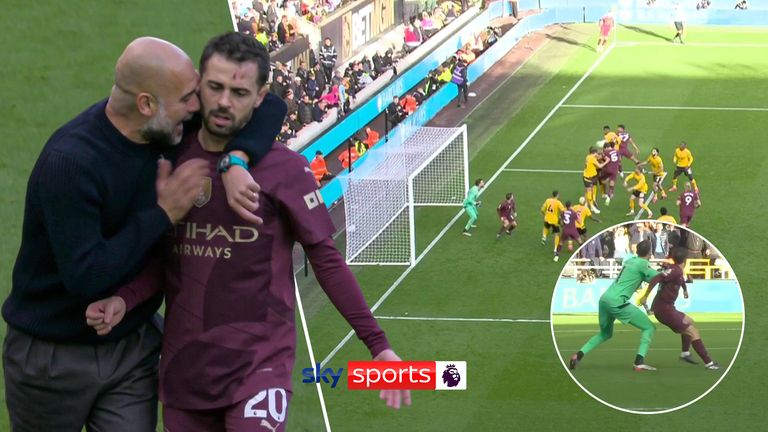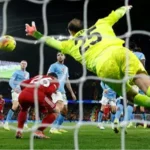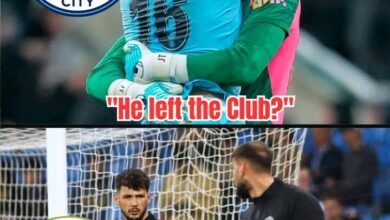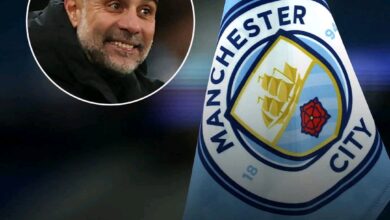Man City Controversy: Fans React to Shock VAR Twist After Analyzing Latest Footage

Manchester City’s dramatic 2-1 victory over Wolverhampton Wanderers has ignited fierce debate across the football world following a contentious VAR decision that allowed John Stones’ 97th-minute winner to stand. What should have been a straightforward celebration for Pep Guardiola’s men has instead morphed into the latest chapter of controversy surrounding the reigning Premier League champions.
The incident occurred deep into stoppage time at Molineux with the score deadlocked at 1-1. As a corner was swung into Wolves’ penalty area, Stones rose highest to power a header past the Wolves goalkeeper. However, celebrations were temporarily halted when referee Chris Kavanagh was summoned to the pitchside monitor to review a potential offside infringement.
At the center of the controversy was Bernardo Silva, who was positioned directly in the goalkeeper’s line of vision when Stones connected with the header. According to the laws of the game, a player in an offside position can be penalized if they are “clearly attempting to play a ball which is close when this action impacts on an opponent” or “making an obvious action which clearly impacts on the ability of an opponent to play the ball.”
Despite multiple camera angles appearing to show Silva obstructing the goalkeeper’s view—and after a lengthy review at the VAR monitor—Kavanagh stunned spectators by allowing the goal to stand. This decision flew in the face of what many observers considered clear evidence and seemingly contradicted guidance from VAR officials.
The timing of this controversy could hardly be more significant in the context of the Premier League title race. With Arsenal having suffered a surprise defeat to Bournemouth the previous day, City’s victory allowed them to capitalize on their rivals’ stumble and strengthen their position at the summit of the table.
For Wolves, who had taken the lead through Jorgen Strand Larsen before Joško Gvardiol equalized for the visitors, the defeat was particularly bitter. Gary O’Neil’s side had defended resolutely for much of the match, frustrating the champions despite City’s customary dominance of possession. To lose in such contentious circumstances has left the Wolves faithful incensed, with many feeling they were denied a deserved point against the title favorites.
“We showed tremendous heart today,” O’Neil told reporters after the match. “To contain a team of City’s qualit
Within minutes of the final whistle, social media platforms were ablaze with reaction to the incident. Video clips of the controversial moment spread rapidly, with fans from clubs across the Premier League united in their criticism of the decision.
“Add that on top of the 115 charges,” wrote one user on X (formerly Twitter), referencing the ongoing Premier League investigation into City’s alleged financial breaches that has yet to reach a conclusion.
“Are we surprised anymore? City are the biggest cheats we have ever witnessed. How that has been given as a goal is shocking but it’s City, what do you expect,” commented another passionate supporter.
The vitriol wasn’t limited to rival fans. Even neutral observers and respected pundits expressed bewilderment at Kavanagh’s decision to uphold the goal.
Former Premier League referee Keith Hackett didn’t mince words in his assessment: “I’m absolutely astounded. The laws of the game are clear on this matter. If a player in an offside position is interfering with the goalkeeper’s line of sight, which Silva clearly was, then it’s offside. This is refereeing 101.”
Sky Sports pundit and former Liverpool defender Jamie Carragher was equally critical during the post-match analysis. “I honestly can’t understand what Kavanagh saw—or didn’t see—during that review. It’s as clear an example of interfering with play from an offside position as you’ll find. Decisions like this damage the credibility of the officiating in our game.”
For many observers, this incident feeds into a growing narrative surrounding Manchester City and favorable officiating decisions. Over the past few seasons, several high-profile calls have gone City’s way at crucial moments, fueling conspiracy theories among rival supporters.
Last season, a contentious handball decision during City’s clash with Arsenal was widely seen as a turning point in the title race. Earlier this campaign, an apparent offside in the build-up to a Erling Haaland goal against Newcastle United went unpunished despite VAR review.
“Kavanagh was doing them favors all afternoon,” claimed one Wolves supporter on social media, suggesting a pattern of preferential treatment throughout the match, not just in the decisive moment.
The Professional Game Match Officials Limited (PGMOL)—the body responsible for referees in English professional football—has yet to comment officially on the incident. However, sources within the organization have indicated that the decision will be reviewed as part of their standard post-match assessment process.
Hanging over all discussions of Manchester City’s on-field fortunes is the unprecedented case involving 115 charges of alleged financial breaches brought by the Premier League in February 2023. The charges relate to alleged failures to provide accurate financial information, details of player and manager payments, compliance with UEFA’s regulations, the Premier League’s profitability and sustainability rules, and alleged failures to cooperate with Premier League investigations.
City have vehemently denied all charges, and the case remains unresolved more than two years after the charges were first announced. The complexity of the allegations and the legal process means a resolution could still be months, if not years, away.
For many rival fans, this ongoing situation colors their perception of City’s achievements on the pitch. Social media reactions to Sunday’s incident frequently referenced these charges, with one fan commenting: “@FA_PGMOL are corrupt man City has to be relegated to non-league.”
Manchester City manager Pep Guardiola, known for his passionate defense of his team, was predictably steadfast in his post-match comments.
“I’ve seen the replay, and for me, it’s a clear goal,” Guardiola insisted. “Bernardo is in a position, yes, but he doesn’t make any movement to interfere with the goalkeeper. The ball goes past him completely. If we want to analyze every small detail in football, we would never finish a game.”
When pressed on the growing narrative around contentious decisions favoring his team, Guardiola became visibly frustrated. “Always the same questions. We win because we play better football, not because of referees. My players deserve respect for what they achieve on the pitch.”
City captain Stones, whose header was at the center of the controversy, was more measured in his response. “These decisions can go either way. Sometimes they favor you, sometimes they don’t. Today we got the break, but there have been plenty of times when decisions have gone against us too. That’s football.”
Former Premier League referee Mark Clattenburg offered a more nuanced perspective on the incident. “The key question is whether Silva is directly in the goalkeeper’s line of sight when Stones makes contact with the ball. From the angles I’ve seen, it’s certainly close, but these decisions are never as clear-cut as fans might think when watching at home.”
Clattenburg added: “The VAR protocol requires ‘clear and obvious’ errors to overturn an on-field decision. If Kavanagh’s initial instinct was that Silva wasn’t interfering with play, he may not have seen enough in the review to consider it a clear and obvious error.”
This explanation has done little to pacify those who feel aggrieved by the decision. Many football supporters are increasingly frustrated with what they perceive as inconsistent application of VAR protocols across different matches and teams.
For Wolves, this defeat is particularly painful given their impressive performance against the champions. Having taken the lead through Strand Larsen’s well-executed finish in the 32nd minute, they defended with discipline and organization before Gvardiol’s equalizer midway through the second half.
Captain Max Kilman expressed the team’s disappointment: “To lose like that is gut-wrenching. We put everything into that performance, and to have it decided by a call that most people seem to think was wrong… it’s hard to take.”
The result leaves Wolves in a precarious position in the lower half of the table, still needing points to guarantee their Premier League safety for another season. Every point is precious at this stage of the campaign, making the manner of this defeat all the more disappointing for O’Neil’s men.
City’s controversial victory maintains their position at the top of the Premier League table, now five points clear of Arsenal with just four games remaining. Liverpool’s defeat earlier in the weekend effectively ended their title hopes, leaving it as a two-horse race between the perennial rivals.
For Arsenal, who had been gaining momentum in recent weeks, the combination of their own defeat to Bournemouth and City’s win at Molineux represents a significant blow to their title aspirations. Mikel Arteta’s side now face an uphill battle to overturn the deficit in the remaining fixtures.
The controversy adds an extra dimension to what was already promising to be a tense run-in to the season. Arsenal supporters have joined the chorus of those questioning the legitimacy of City’s victory, creating an even more heated atmosphere around the title race
This incident raises further questions about the implementation of VAR in the Premier League. Despite being introduced to reduce officiating errors, the technology has often seemed to create as many controversies as it resolves.
The subjective nature of many football rules—including those surrounding offside and interference with play—means that even with technological assistance, decisions can still come down to individual interpretation. Sunday’s incident at Molineux exemplifies this problem perfectly.
Former England international and respected pundit Gary Lineker voiced his frustration on social media: “VAR was supposed to eliminate clear and obvious errors, but it seems to be creating a whole new category of them. What’s the point of sending the referee to the monitor if he’s going to ignore what everyone else can see?”
As the dust settles on this latest controversy, attention will inevitably turn to the remaining fixtures in the Premier League season. City face a potentially tricky run-in, including matches against Tottenham and West Ham, while Arsenal’s schedule appears slightly more favorable on paper.
Whether Sunday’s incident will prove decisive in the title race remains to be seen, but it has certainly added another layer of intrigue to what has already been an enthralling season.
For the Premier League and PGMOL, this controversy represents yet another headache in what has been a difficult season for officials. Calls for greater transparency in the VAR process and improved communication with fans are likely to grow louder following this incident.
Beyond the immediate controversy, this incident feeds into broader conversations about competitive balance in the Premier League. Manchester City’s dominance—both financially and on the pitch—has transformed the landscape of English football over the past decade.
While their on-field success is undeniable, the ongoing investigation into alleged financial breaches has cast a shadow over their achievements for many observers. Sunday’s controversial victory will do little to change the minds of those who believe the club receives preferential treatment.
For now, City march on in their pursuit of an unprecedented fifth consecutive Premier League title. Whether their latest victory will be remembered for Stones’ dramatic header or the controversy that followed remains to be seen, but one thing is certain: the debates around this incident will rumble on long after the final whistle at Molineux.
As football enters the crucial final weeks of the season, the fallout from Sunday’s controversy at Molineux serves as a reminder of the fine margins that often decide championships. For Manchester City, it’s another three points on their march toward potential glory; for Wolves, it’s a bitter pill to swallow; and for neutral observers, it’s the latest chapter in ongoing discussions about fairness, consistency, and transparency in football officiating.
With the Premier League investigation into City’s alleged financial breaches still looming large in the background, every controversial decision involving the champions inevitably becomes viewed through this particular lens. Whether that’s fair or not is another debate entirely, but it’s the reality of the current football landscape.
As one season reaches its climax and attention begins to turn toward the next, the questions raised by Sunday’s incident will continue to resonate throughout English football. The beautiful game, as always, remains as contentious off the pitch as it is captivating on it.















